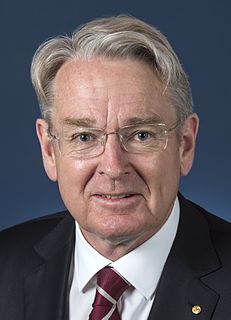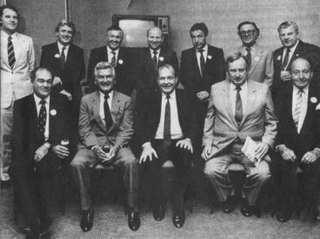Related Research Articles

Bunbury is a coastal city in the Australian state of Western Australia, approximately 175 kilometres (109 mi) south of the state capital, Perth. It is the state's third most populous city after Perth and Mandurah, with a population of approximately 75,000.

Carmen Mary Lawrence is an Australian academic and former politician who was the Premier of Western Australia from 1990 to 1993, the first woman to become the premier of an Australian state. A member of the Labor Party, she later entered federal politics as a member of the House of Representatives from 1994 to 2007, and served as a minister in the Keating Government.
Sir Ronald Darling Wilson, was a distinguished Australian lawyer, judge and social activist serving on the High Court of Australia between 1979 and 1989 and as the President of the Human Rights and Equal Opportunity Commission between 1990 and 1997.
Geoffrey Daniel Prosser is an Australian businessman and former politician. He served in the House of Representatives from 1987 to 2007, representing the Liberal Party, and was Minister for Small Business and Consumer Affairs in the Howard Government from 1996 to 1997.

Richard Fairfax Court is a former Australian politician and diplomat. He served as Premier of Western Australia from 1993 to 2001 and as Australian Ambassador to Japan from 2017 to 2020. A member of the Liberal Party, he represented the Perth-area electorate of Nedlands in the Western Australian Legislative Assembly from 1982 to 2001. His father Charles Court also served as state premier.

Peter M'Callum Dowding SC is a lawyer and former politician who served as the 24th Premier of Western Australia, from 25 February 1988 until his resignation on 12 February 1990 after an internal party dispute.
Brian Thomas Burke was Labor premier of Western Australia from 25 February 1983 until his resignation on 25 February 1988. He was imprisoned for seven months in 1994, after being convicted of "false pretence" regarding travel expenses.

Raymond James O'Connor was an Australian politician. He served as the 22nd premier of Western Australia, from 1982 to 1983. In 1991, he was convicted of fraud as part of the WA Inc scandal, and served a six-month jail term.

WA Inc was a political scandal in Western Australia. In the 1980s, the state government, which was led for much of the period by premier Brian Burke, engaged in business dealings with several prominent businessmen, including Alan Bond, Laurie Connell, Dallas Dempster, John Roberts, and Warren Anderson. These dealings resulted in a loss of public money, estimated at a minimum of $600 million and the insolvency of several large corporations.
Julian Fletcher Grill is an Australian former politician. Grill was a member of the Parliament of Western Australia between 1977 and 2001.
The Dowding Ministry was the 30th Ministry of the Government of Western Australia, and was led by Labor Premier Peter Dowding and his deputy, David Parker. It succeeded the Burke Ministry on 25 February 1988, upon the retirement of Brian Burke from politics on the fifth anniversary of his becoming Premier.
Formed in Perth, Western Australia in October 1984, the John Curtin Foundation was a fundraising organisation for the Australian Labor Party which attracted the sponsorship of a powerful group of wealthy businessmen, placing them in a privileged circle with direct access to both the Australian prime minister Bob Hawke and the state premier Brian Burke. The foundation was an early step to the creation of a unique network of corporate and government co-operation which was dubbed WA Inc by news media. Its two vice-patrons were Kim Beazley, senior, a former Whitlam Government minister, and Mick Michael, an electrical contractor and former lord mayor of Perth. The executive-government patronage of business was similar to Peronism in Argentina. It caused multiple financial disasters, leading to a royal commission which exposed and condemned the corruption.
Warren Perry Anderson is an Australian businessman and speculative investor whose net worth in 1990 was estimated by the BRW magazine at $190 million, although the following year he was reported to have debts of $500 million, and filed for bankruptcy.
David Charles Parker is a former Australian politician from Western Australia, serving as a minister in the Burke Ministry (1983–1988), then as Deputy Premier in the Dowding Ministry (1988–1990). He later served a jail term for perjury for evidence given to the WA Inc royal commission.
Dallas Reginald Dempster was an Australian businessman notable for the original development of Perth's Burswood Resort and Casino and the proposed Kwinana Petrochemical Plant, both of which were among the Western Australian government transactions examined by the 1990–92 WA Inc Royal Commission. In November 2013 The West Australian newspaper named Dempster as one of Western Australia's 100 most influential business leaders (1829–2013).
The Kwinana petrochemical plant was a never-realised petrochemical plant proposed in the late 1980s to be developed in Kwinana, Western Australia.
The Western Australian Development Corporation (WADC) was a trading corporation established in 1983 by the first Burke Ministry of Western Australia. It enabled the state Labor government to involve itself in large-scale business transactions without the normal transparency and accountability of government-guaranteed corporations, and was part of what became known as WA Inc. It appointed John Horgan chairman on a salary of $800,000 p.a., and formed subsidiaries including Exim Corporation which sought to create and exploit export markets for education and other products. The enabling Act provided that "(4.3) The Corporation is an agent of the Crown in right of the State and enjoys the status, immunities and privileges of the Crown..." while "(4.4) Notwithstanding subsection (3), the Corporation shall not be subject to direction by the Minister..."
[T]o make sure he kept secret the dealings of the WADC and its shady subsidiaries such as Exim Corporation, [Burke] pushed through legislation that not only gave them commercial confidentiality but unshackled them from ministerial accountability. The WADC was just one of many Burke creations synonymous with the corporatism of the WA Inc era -- a failed political strategy that folded high-risk business into unethical government and led to financial and social upheaval still resonating a quarter of a century later.
Bevan Ernest Lawrence, a retired Western Australian barrister and political campaigner, is the older brother of Carmen Lawrence, a former premier of Western Australia. In the 1980s he was a convenor of two notable lobby groups that influenced the course of government at federal and state levels.
Pamela Anne Beggs is a former Australian politician who was a Labor Party member of the Legislative Assembly of Western Australia from 1983 to 1993, representing the seat of Whitford.
The Teachers' Credit Society (TCS) was a credit union founded in 1971 best known for its part in the WA Inc scandal of 1987. Over the 16 years it operated, the TCS grew from a 300-member society into the largest credit union in Australia, with 40,000 members and A$550 million on deposit and millions out on loans. The TCS was considered one of the major driving forces behind the 1980s "debt-funded boom" in WA and its collapse, along with the collapse of several other large corporations within WA such as Qintex, Bond Corporation and The Bell Group, triggered an economic recession in the state.
References
- ↑ Webb, Richard (16 November 1990). "Connell & cohorts in court" . The Australian Financial Review. Retrieved 22 June 2020.
- ↑ WA Police
- ↑ "Businessmen behaving badly". Sydney Morning Herald. 14 April 2005. Retrieved 26 July 2006.
- ↑ Big Brother Jack The Canberra Times , 28 May 1989, at Trove
- 1 2 ""The Track" (transcript) Episode five: "Follow the Money"". ABC Television. August 2000. Retrieved 18 November 2007.
- ↑ Paul Daffey's Item 9' 'The Bunbury Hop-off' at The Ten The Age, 31 October 2004
- ↑ Presnell, Max (30 July 2011). "Tale of a true scoundrel" . The Sydney Morning Herald. Retrieved 22 June 2020.
- ↑ Bourke, Tony (3 June 2008). "Putting to rest a myth about a controversial stayer" . The Age. Retrieved 21 February 2009.
- ↑ Report of the Royal Commission to inquire whether there has been (a) corruption; (b) illegal conduct; or (c) improper conduct, by any person or corporation in the affairs, investment decisions and business dealings of the Government of Western Australia or its agencies, instrumentalities and corporations, part II, page 22
- ↑ "WA Inc gets an inquiry, at last". The Sydney Morning Herald. 21 November 1990. p. 14.
- ↑ Brown, Kevin (20 November 1990). "W Australia to mount corruption inquiry". Financial Times. p. 4.
- ↑ Insolvency and Succession Law 27 June 2009, pp. 13–14, at Sally Nash & Co, Lawyers
- ↑ "Connell's seized art goes to auction.(Local)", The Australian, News Limited, p. 008, 26 January 2000, retrieved 26 June 2012
- ↑ "Bids fly for piece of Connell.(Local)", The Australian, News Limited, p. 008, 31 January 2000, retrieved 26 June 2012